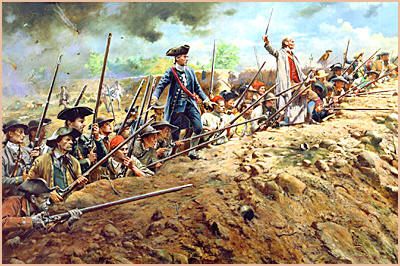Battle of Bunker Hill
17th
June 1775
Among those Sons of Liberty
who rallied ‘round the flags of Liberty were large numbers of
Irish. Historian Michael J. O’Brien wrote of The Irish at
the Battle of Bunker Hill (17 June 1775), most notably of
Dr. Joseph Warren. O’Brien also wrote of the Irish contribution
to many other aspects of the achievement and defense of the
Independence of the United States. His research confirmed that
the Irish in America, from Richard Montgomery, Anthony Wayne and
John Sullivan, to Stephen Moylan, Daniel Morgan, Timothy Murphy
and Hercules Mulligan, and to many who lie in unmarked Patriot
graves, volunteered for the Patriot cause in greater proportion
to their numbers in the population than probably any other
group.
“Don’t
shoot ‘till you see the whites of their eyes!”

Bunker Hill
by Don Troiani
Here stand the raw American
militia in the main redoubt at Breed's Hill as they are about to
fire upon the seemingly endless advancing ranks of British
regulars. The President of the Massachusetts Provincial
Congress, Dr. Joseph Warren is the senior officer present, here
standing on the rampart, encouraging his fellow Patriots
throughout the battle. Warren would be killed during the third
and final assault, after the defenders’ ammunition had begun to
run out. Colonel Prescott stands on the works with his sword
ready to give the famous command that would reshape American
history forever.
United in the face of a
common enemy (1775/76), the American Patriots soon realized that
the success of their defense of Liberty would require the
putting aside of many old differences; in State after State
freedom of conscience in worship and in speech replaced old
laws and practices regarding the establishment of religion.
Americans in every State were determined that an alien
government should not have the opportunity to foster differences
which had divided a minority from the majority in the past (as,
in fact, the English would attempt during the course of the
conflict). These freedoms would later be enshrined in the
Constitution of the United States of America, under the First
Amendment (“Congress shall make no law respecting an
establishment of religion, or prohibiting the free exercise
thereof; or abridging the freedom of speech, or of the press; or
the right of the people peaceably to assemble, and to petition
the Government for a redress of grievances.” American
“Bill of Rights” – Ratified 15 December 1791).
The words of the American
Declaration of Independence, 4th of July 1776,
which should be music to the ears of decent men everywhere, were
particularly sweet to the Irish, for whom the experience of
tyranny had been first-hand in their homeland. [In part: “…We
hold these truths to be self-evident, that all men are created
equal, that they are endowed by their Creator with certain
unalienable rights, that among these are life, liberty and the
pursuit of happiness. That to secure these rights, governments
are instituted among men, deriving their just powers from the
consent of the governed. That whenever any form of government
becomes destructive to these ends, it is the right of the people
to alter or to abolish it, and to institute new government,
laying its foundation on such principles and organizing its
powers in such form, as to them shall seem most likely to effect
their safety and happiness….”]
Back to Articles